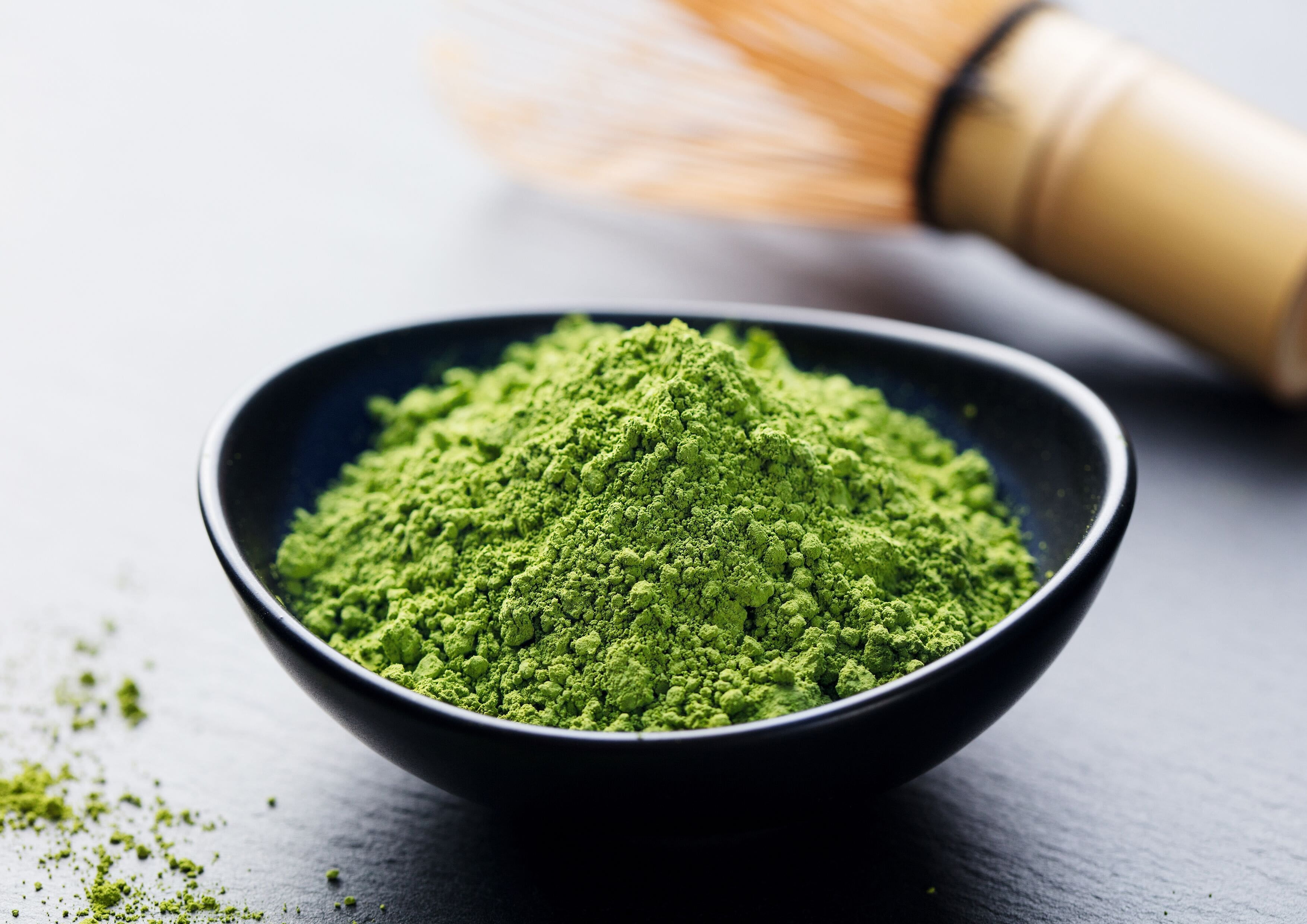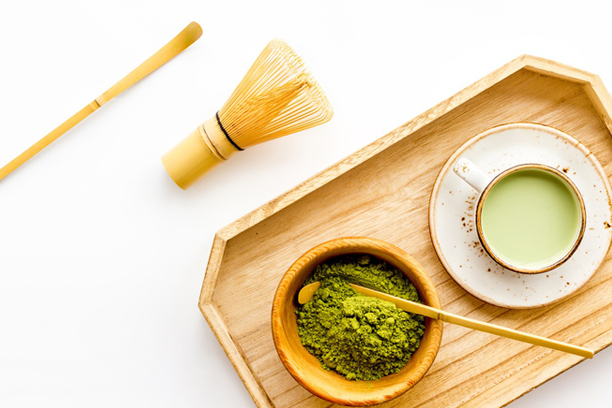how much caffeine is in matcha powder?
Matcha has become a popular alternative to coffee thanks to its vibrant flavor, beautiful color, and smooth, sustained energy release. But for anyone monitoring their caffeine intake — whether for health, performance, or lifestyle reasons — an important question comes up:
Understanding Matcha Powder
Matcha is made from the leaves of the Camellia sinensis plant. Special cultivation methods like shading boost the amino acid content, giving matcha its characteristic rich umami flavor and bright green color. The leaves are harvested by hand, steamed, stemmed, and deveined before stone-grinding into a fine powder (1).
In traditional Japanese tea ceremonies, matcha is prepared by whisking the powder with hot water to make a frothy beverage. Today matcha appears as an ingredient or flavoring in all types of foods and drinks. Quality matcha delivers a complex flavor profile and intense antioxidant levels compared to regular green tea.

How much caffeine is actually in matcha powder?
The answer might surprise you. Matcha contains more caffeine per gram than regular green tea and can even rival coffee, but the way it affects the body is very different.
In this in-depth guide, we’ll explore how much caffeine matcha contains, how it compares to coffee and other teas, how it affects the body, and how to consume it safely for the best benefits.

How Much Caffeine Is in Matcha Powder?
Matcha contains caffeine because it originates from the tea plant. Standard green tea averages around 35mg of caffeine per 8oz serving. Matcha clocks in higher at around 70mg per 8oz serving. However, caffeine levels in matcha can range from 28mg to over 100mg per 8oz serving based on various factors (2).
By comparison, brewed coffee has about 95mg of caffeine per 8oz cup. Energy drinks can contain over 150mg per 8oz serving. So matcha is generally lower in caffeine than coffee or energy drinks (3). However it is higher in caffeine content compared to other types of green tea.
Matcha’s precise caffeine levels depend on cultivation methods, plant genetics, harvesting techniques, and processing procedures. No two matcha products will be identical in their caffeine content.
On average:
| Product | Serving Size | Approximate Caffeine Content |
|---|---|---|
| Matcha Powder | 1 teaspoon (2g) | 60–80 mg |
| Regular Green Tea | 1 tea bag (2g steeped) | 20–30 mg |
| Black Tea | 1 cup | 40–60 mg |
| Coffee | 1 cup (brewed) | 80–120 mg |
| Espresso | 1 shot (30ml) | 60–70 mg |
Key Takeaway:
A standard serving of matcha contains about as much caffeine as a shot of espresso or a small cup of coffee. However, users typically report that matcha delivers smoother energy without jitters or a crash. Let’s explore why.
Why Matcha Feels Different From Coffee – Caffeine + L-Theanine Effect
Unlike coffee, matcha naturally contains L-theanine, an amino acid known for its calming, stress-reducing effects.
How the Combination Works:
-
Caffeine → Increases alertness and energy.
-
L-Theanine → Promotes relaxation and focus without sedation.
-
Result → Smooth, sustained energy and mental clarity for 4–6 hours without anxiety or energy crash.
This synergy is why matcha is often preferred by students, professionals, and meditators seeking focus without overstimulation.
Factors That Affect Caffeine Levels in Matcha
Multiple variables can alter the caffeine levels found in matcha powder:
- Age of the tea leaves - Older leaves contain more caffeine
- Shading techniques - More shading boosts amino acids and caffeine
- Harvesting time - Spring teas have lower caffeine than autumn teas
- Varietal or cultivar - C. sinensis varietals have varying caffeine levels genetically
- Grinding method - Finer grinds release more caffeine from leaves
- Preparation style - Concentrated forms have higher caffeine
Within authentic matcha production, caffeine content differences are generally not extreme. But matcha can vary
from relatively low to quite high in caffeine depending on these cues.
How Much Matcha Can You Safely Consume Per Day?
Most health experts recommend not exceeding 200–300 mg of caffeine per day for a healthy adult.
| Matcha Serving | Caffeine |
|---|---|
| 1 tsp (2g) | ~70 mg |
| 2 tsp (4g) | ~140 mg |
| 3 tsp (6g) | ~210 mg |
Safe Daily Intake:
-
1–2 servings per day is considered safe for most people.
-
Pregnant or breastfeeding women should limit intake to a single serving daily and consult their healthcare provider.

Managing Matcha Consumption
For those concerned about caffeine, there are ways to moderate matcha intake:
- Choose ceremonial grade for lower caffeine levels and better flavor.
- Use smaller serving sizes like 1⁄2 - 1 teaspoon.
- Limit intake to 1 cup per day, avoiding afternoon or evening consumption.
- Opt for matcha lattes made with decaf green tea or herbal “teas”.
- Switch to caffeine-free matcha or lower-caffeine powdered green tea.
- Look for Swiss water process (SWP) decaffeinated Pure Matcha Green Tea Powder.
Pay attention to your own reactions to matcha caffeine. Reduce or avoid matcha if it causes unwanted stimulation or disrupts sleep.
Matcha vs. Coffee – Which One Should You Choose?
| Feature | Matcha | Coffee |
|---|---|---|
| Caffeine Release | Slow and steady | Fast spike and crash |
| L-Theanine (Calming Effect) | Yes | No |
| Antioxidant Content | Very high (EGCG & catechins) | Moderate |
| Acidity & Digestive Impact | Low irritation | Can cause acidity or jitters |
| Best For | Focus, sustained energy, calm alertness | Quick energy boost |
Matcha Energy Timeline – What to Expect
| Time After Drinking Matcha | What Happens |
|---|---|
| 0–15 mins | Caffeine begins absorption |
| 15–45 mins | L-Theanine modulates caffeine → Focus and calm alertness kick in |
| 45–120 mins | Peak mental clarity and energy |
| 2–4 hours | Sustained focus without spikes |
| 4–6 hours | Gradual energy taper — no crash |
Is Matcha a Good Alternative for Caffeine-Sensitive Individuals?
Yes — in moderation.
Those sensitive to caffeine may still tolerate matcha better than coffee due to its slower absorption and calming amino acid content. However:
-
Start with ½ teaspoon per serving
-
Observe your energy and sleep patterns
-
Avoid matcha after 3 PM if you're sensitive or have insomnia tendencies
:max_bytes(150000):strip_icc()/GettyImages-2202068971-87511823a6a144afbdb2e216d27005c8.jpg)
Conclusion
So, how much caffeine is in matcha powder? Around 60–80 mg per teaspoon, similar to a shot of espresso — but with a smoother, more balanced effect thanks to L-theanine.
If you're looking for clean, sustained energy, mental clarity, antioxidant protection, and a gentler alternative to coffee, matcha is an excellent choice — whether for personal wellness or as a functional ingredient in product formulations.
Looking for High-Quality Matcha for Bulk Supply or Product Manufacturing?
Yangge Biotech supplies premium-grade Matcha Green Tea Powder suitable for beverages, supplements, and functional food applications. Available in ceremonial, premium, and culinary grades with COA and third-party testing.
Want to learn more or request samples? — Contact Yangge Biotech for sourcing and formulation support.
References:
1. https://www.ncbi.nlm.nih.gov/pmc/articles/PMC9791535/
2. https://pubmed.ncbi.nlm.nih.gov/28970885/
3. https://www.mayoclinichealthsystem.org/hometown-health/speaking-of-health/are-there-health-benefits-to-drinking-matcha-tea
4. https://pubmed.ncbi.nlm.nih.gov/23349835/
5. https://www.healthline.com/nutrition/l-theanine#effects-on-brain
6. https://www.ncbi.nlm.nih.gov/pmc/articles/PMC4987244/
7. https://www.ncbi.nlm.nih.gov/pmc/articles/PMC9791535/
8. https://link.springer.com/article/10.1007/s13197-019-04075-5
9. https://www.healthline.com/nutrition/caffeine-in-matcha#caffeine-content
10. https://pubmed.ncbi.nlm.nih.gov/23349835/
Send Inquiry
Related Industry Knowledge
- Green Coffee Bean Extract: A Natural Boost for Health and Wellness
- Blue Spirulina E10: Nature’s Blue Superfood
- High Quality Ginkgo Biloba Supplement UK Benefits
- Best Benefits of Acidophilus Capsules
- Creatine Tablets: Monohydrate, Pure, and Vegan
- Glutamine Powder for Muscle Boost
- What does the liposomal creatine do?
- what is soy lecithin used for in food
- What are the health benefits of fucoxanthin powder
- What are the medicinal benefits of Cordyceps militaris powder?


